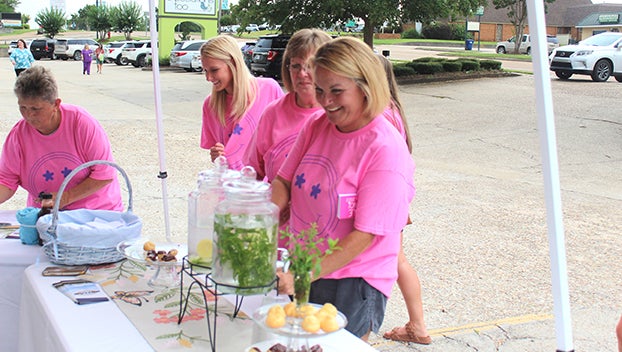Long-time paramedic enjoys helping others
Published 1:00 pm Thursday, May 30, 2024

- PHOTO SUBMITTED From left, KDMC paramedic partners Kevin Copeland, Jimmy Martin, Lonnie Ferrell and Tony Banda.
His father was an Army combat medic, and for a short time his younger brother was an emergency medical technician.
When Jimmy Martin was just a child, he would pick up his dad’s Army books and read them, so maybe they began to influence him toward his ultimate career as a paramedic. But it was a particular event with his brother that cemented for Martin what he needed to do with his life.
“A long time ago, I went with him one time on call to a school bus wreck, in case they needed some help,” Martin said. “I guess the bug bit me, and I thought, ‘I can do this.’ Apparently, that was what the Lord had for me, because I’ve been doing this a long time.”
In order to be a paramedic, first you have to go to EMT school, then paramedic school. Though people going into the field today need an associate’s degree, when Martin started, it was a certificate you earned when you completed paramedic training. Then a National Registry exam is required for all paramedics in Mississippi.
“We have to recertify every two years,” Martin said. “That’s a 48-hour refresher course, and you have 24 hours of continuing education … getting hours for staying certified.”
The Lincoln County native has worked for King’s Daughters Medical Center Emergency Medical Services for 28 years. During his first year with the ambulance service, Martin and his partners went out on just fewer than 2,000 calls with two ambulances.
“Last year, we ran over 6,600 calls,” he said. That’s with the addition of only one more ambu-lance. “We average 15 to 20 calls during a typical 24-hour shift in Lincoln County.”
Martin said many people have a misconception of what first responders do, or how they do it, due to what they see in movies or on television.
“What people see with paramedics, fire, ER, nurses, police on TV, is just that — it’s on TV. It’s not true to Lincoln County, anyway,” he said. “People see paramedics running, for instance. We don’t run. If you see me running, you better fall in line because something’s happening.”
As a first responder in the medical field, Martin said they all have good calls and bad calls.
“Some stuff, we sit around the office and reminisce about the funny, odd things. We don’t hardly ever talk about the bad stuff.”
The hospital has provided a good support system for when he and his partners need to debrief after a particularly bad call, “But me and most of my group, we just lean on each other, is what we do.”
He said he also has a strong support group at home in his wife and adult daughter.
“You have calls when you think, I could have done this or that different,” Martin said. “But a good call, even if it’s tragic for another family, if you do everything well and it flows, and you and your partner are on-point that day, everything just flows, that’s a good call.”
He said they very rarely see victims again after helping them in an emergency, but it does hap-pen sometimes. He saw a man several months after helping him during a cardiac arrest, and the patient had made a full recovery.
“That’s a good call.”
He remembered helping a woman several years ago who had gotten caught in a house fire, and was close to death when they got to her.
“We intubated her. We had to secure her airway; she had gotten inhalation burns,” Martin said. “A couple of years after that, she walked in the station and hugged my neck. It’s worth it.”
Martin said he’s not sure if his dad’s Army service influenced him to go into the medical field, but he knows that day with his brother certainly did. But what keeps him going is the joy he gets from the work.
“I really, really enjoy helping people. I really do. To me it’s not just a job. I think this is what the Lord wanted me to do. If not, I couldn’t have done it as long as I have.”





